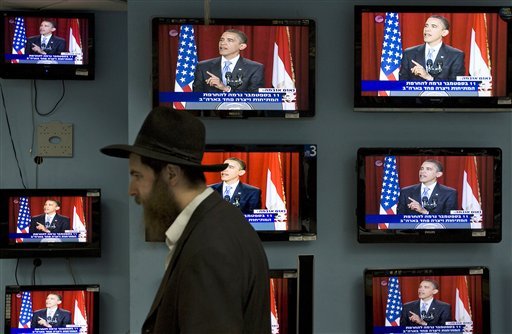Policy on Israel blocks Obama's room to move among Arab people

Another Presidents’ speech – another disappointment
Chris Doyle
20 May 2011
Throughout the Arab World the people have shown remarkable courage. They stood up to guns and tanks, to brutal regimes and have changed the political map forever.
The challenge for President Obama in his speech on 19 May was to show similar fortitude, to tear up US foreign policy that has propped up dictators, armed them and routinely put narrow short-term US interests above the interests of the Arab peoples, their rights, aspirations and freedom. It needed to show that he could stand up to the Likud Israel lobby, to AIPAC and insist that Palestinians have their rights too, including the right to self-determination, and a full end to occupation.
This President’s speech was a letdown like so many recent Presidents’ speeches. It may not have damaged Obama’s 2012 hopes but it reaffirmed US decline and irrelevance in the region, just as Al Qaeda has become irrelevant. Obama still cannot find the route out of the maze and the logjam where US policy is trapped by its knee-jerk, come what may support for Israel, and its need to control oil supplies all of which rub up against this stated desire to support democratic change. Sure, there many lofty ideals expressed but they rang hollow against the reality of US actions and its inconsistencies.
These contradictions litter his speech. He criticised various regimes for human rights abuses yet never condemns Israel when it does the same. He calls on minority rights to be respected but supports Israel as a Jewish state, thereby downgrading the rights of the Palestinian citizens of Israel. He says that the US “values the dignity of the street vendor in Tunisia more than the raw power of the dictator,” yet still describes President Salih as a friend. Every Egyptian will remember that Obama delayed in supporting them as they faced Mubarak’s thugs in Tahrir square and elsewhere, whilst his Secretary of State for Defence Robert Gates praised the regime’s “restraint”.
Some expressed surprise that Obama supported a Palestinian state based on the 1967 lines, yet President Clinton had done this previously, and all it meant was that he vaguely aligned himself with so much of the established thinking in the rest of the world. To say that a Palestinian state should be contiguous is hardly revelatory. He would have had more credibility if he had outlined his preferred mechanism and timetable for achieving this. He talked about colonialism having ended 50 years ago, forgetting Israeli settlements are colonies, and rapidly expanding (Israel having approved 1500 new units on the same day to show its traditional defiance). The President spoke of the right to chose one’s own leaders, forgetting the US had denied this to the Palestinians in refusing to accept the result of the 2006 elections.
As for Iraq there was barely a mention. It was merely to highlight the drawdown of troops. There was no contrition for the US role and responsibility in helping to devastate the country.
If there was one area that surprised some, it was Bahrain. Obama had a strong message regarding human rights, after many had accused the US of being too quiet about its repressive practices.
Britain will no doubt follow suit, echo the President’s words along with EU partners. It should not. Bold leadership should not be dependent on the White House. Europe’s interests are massively at stake. The Arab World is on our borders. EU leaders have the chance to show the sort of dynamic rights based leadership that the White House has not, and thereby establishing itself as a truly global leader and genuine partner for Arab democrats and those who cherish a brighter future. Bringing about genuine Palestinian independence in September, would be a start.
